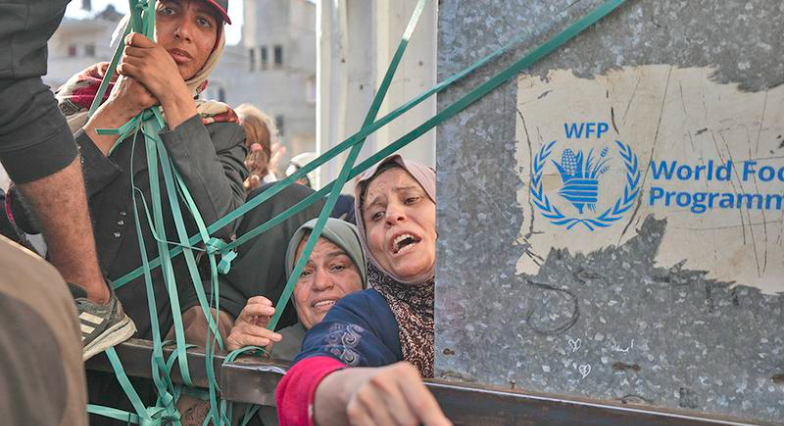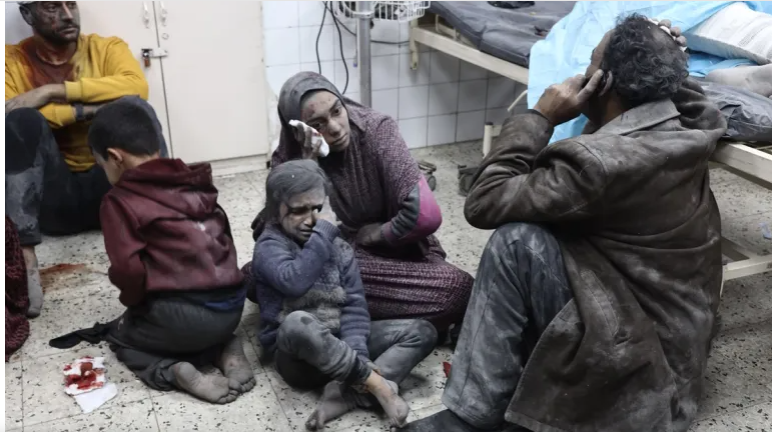1. Introduction
Amnesty a recent and profoundly alarming statement, Amnesty International has accused Israel of committing genocide against Palestinians in Gaza, citing a series of deadly attacks, the destruction of vital infrastructure, and the deliberate hindrance of aid deliveries. The accusation, made amidst the ongoing conflict, has sparked widespread outrage and concern within the international community, raising questions about the future of the region and the broader geopolitical implications of the conflict.
As the humanitarian crisis in Gaza worsens, with thousands of civilians suffering from starvation, displacement, and lack of access to basic necessities, the accusation of genocide adds a new dimension to the already complex and volatile situation. Amnesty’s report suggests that Israel’s actions are not only systematic and deliberate but aim to destroy the Palestinian people and their ability to survive, through both military operations and the systemic denial of humanitarian assistance.
The involvement of global powers, particularly the United States and other allies of Israel, is also called into question. Amnesty claims that these nations, by supporting Israel’s actions and failing to hold the country accountable, may be complicit in what it describes as genocide. This report comes at a time when the conflict shows no signs of abating, and the international community faces mounting pressure to respond to what many see as a dire humanitarian catastrophe.  For the more information click on this link
For the more information click on this link
2. Amnesty’s Genocide Allegations: A Detailed Overview
Amnesty International’s accusations of genocide against Israel come in the wake of the most intense escalation in the Israeli-Palestinian conflict in recent memory. The rights organization has documented a wide array of human rights violations and war crimes committed by Israeli forces in Gaza. Among the most significant charges is the deliberate targeting of civilian infrastructure, including hospitals, schools, and residential buildings, which are vital to the survival and wellbeing of the Palestinian population.
The report claims that Israel’s actions have not been aimed at military targets alone but have instead sought to destroy the very foundation of Palestinian society. This includes the widespread bombing of civilian areas, the use of heavy artillery and airstrikes in densely populated urban areas, and the cutting off of access to essential goods and services. Amnesty describes these actions as an intentional effort to dismantle the basic infrastructure that sustains Palestinian life.
One of the most controversial elements of the report is the accusation that Israel is deliberately preventing the delivery of humanitarian aid to Gaza. Medical supplies, food, and water have been severely restricted, and aid convoys have faced frequent blockades and attacks. The report argues that this systematic denial of aid is a form of collective punishment against the Palestinian people, compounding the devastating impact of Israel’s military operations.
Amnesty’s allegations also highlight Israel’s actions as part of a broader pattern of ethnic cleansing and population displacement. The rights organization suggests that the displacement of Palestinians from Gaza is not a result of military strategy but part of a coordinated effort to permanently alter the demographic makeup of the region and to erase the Palestinian presence in Gaza.
3. The Humanitarian Crisis in Gaza: Starvation and Destruction
The dire humanitarian situation in Gaza has reached unprecedented levels. With the region already suffering from a crippling blockade imposed by Israel for over a decade, the recent escalation of violence has pushed Gaza to the brink of collapse. The Israeli attacks have destroyed critical infrastructure, including water treatment plants, electricity grids, and medical facilities, leaving the population without access to basic services.
According to local reports, civilians in Gaza are facing extreme shortages of food, clean water, and medical supplies. The lack of electricity has crippled hospitals, which are overwhelmed with casualties from the ongoing attacks. The destruction of homes, schools, and businesses has left thousands of Palestinians displaced and living in overcrowded conditions, without access to adequate shelter or sanitation.
Women and children, in particular, are bearing the brunt of this humanitarian disaster. In Deir al-Balah, a town in central Gaza, women have been seen queuing outside bakeries for hours in an attempt to secure food for their families. Many have reported walking for miles in search of basic provisions, only to return empty-handed. The situation has worsened with the lack of international aid, as Israel has imposed stringent restrictions on the entry of humanitarian convoys.
This starvation, compounded by the lack of medical care, has led to an alarming increase in preventable deaths. The United Nations has warned that Gaza is facing one of the worst humanitarian crises of the 21st century, with no clear end in sight. Despite these alarming conditions, the international community remains divided on how to address the situation.
4. The Role of Israel: A Deliberate Policy of Destruction?
Israel’s military actions in Gaza are framed as part of its broader strategy to combat militant groups, primarily Hamas, which controls Gaza and has engaged in violent confrontations with Israel over the years. The Israeli government maintains that its operations are aimed at dismantling Hamas’s military infrastructure, preventing attacks on Israeli civilians, and ensuring national security.
However, the scale and scope of Israel’s military operations have drawn sharp criticism from human rights organizations and international observers. Many argue that Israel’s tactics go beyond targeting militants and instead involve collective punishment against civilians. The disproportionate use of force, particularly the bombing of civilian areas, has been criticized as a violation of international law.
Critics of Israel’s actions argue that the deliberate targeting of civilian infrastructure, such as schools and hospitals, shows a clear intent to harm the civilian population and destabilize Palestinian society. The destruction of these vital facilities, which are critical to the survival and well-being of the population, is seen as evidence of a broader strategy of annihilation rather than a targeted military campaign against militants.
Furthermore, Israel’s refusal to allow humanitarian aid to enter Gaza has been widely condemned. The blockade of food, water, and medical supplies has exacerbated the suffering of the Palestinian population, leaving them vulnerable to disease, malnutrition, and lack of medical care. Amnesty’s report suggests that this blockade is not only a violation of the rights of Palestinians but also a form of genocide, as it contributes to the destruction of the Palestinian people by depriving them of the means to survive.
5. The United States and Global Complicity: A Question of Accountability
One of the most controversial aspects of Amnesty’s report is its suggestion that the United States and other allies of Israel could be complicit in the genocide against Palestinians. Amnesty argues that the U.S., as Israel’s closest ally and a major provider of military aid, bears responsibility for the consequences of Israel’s actions.
The U.S. has long supported Israel’s right to self-defense but has faced criticism for providing billions of dollars in military aid to Israel without holding the country accountable for its actions in Gaza. This support, Amnesty suggests, has enabled Israel to carry out its operations with little concern for international consequences. By providing military aid, diplomatic cover, and financial support, the U.S. and other Western nations are seen by critics as complicit in the destruction of Gaza and the suffering of its people.
Amnesty International’s report calls for greater international accountability, urging the United Nations and other global bodies to take action to prevent further atrocities. The report calls for an end to the blockade, the provision of humanitarian aid, and the protection of civilian infrastructure from further destruction. Moreover, it stresses the need for an independent investigation into the allegations of genocide, with a view to holding Israel accountable for its actions.
The question of accountability is complicated by the geopolitical dynamics of the region, with Israel enjoying strong support from the U.S. and other Western nations. Despite widespread condemnation from human rights organizations and some governments, Israel has continued to receive diplomatic and military backing, preventing meaningful international intervention.
6. The Legal Framework: Is This Genocide?
The legal definition of genocide, as outlined by the United Nations in the Convention on the Prevention and Punishment of the Crime of Genocide, includes acts committed with intent to destroy, in whole or in part, a national, ethnical, racial, or religious group. These acts can include killing members of the group, causing serious bodily or mental harm, and deliberately inflicting conditions that would lead to the group’s destruction.
Amnesty’s assertion that Israel’s actions in Gaza amount to genocide is based on its belief that Israel is deliberately targeting Palestinian civilians with the intent to destroy them as a group. The organization points to the large-scale destruction of homes, schools, hospitals, and other civilian infrastructure, as well as the blockade that prevents access to essential supplies, as evidence of a strategy aimed at eradicating the Palestinian population.
However, Israel rejects these claims, arguing that its actions are in response to militant activity within Gaza, and that its military operations are legitimate under international law. Israel maintains that its operations aim to protect its civilians from attacks by Hamas and other militant groups and that it takes steps to minimize civilian casualties.
The question of whether Israel’s actions meet the legal definition of genocide is one that will likely continue to be debated in international courts and political forums. However, the allegations by Amnesty have sparked renewed calls for accountability and for a re-examination of Israel’s conduct in Gaza.
7. The Path Forward: A Call for International Action
The situation in Gaza is dire, and the international community must respond with urgency and compassion. The ongoing humanitarian crisis, compounded by allegations of genocide, calls for immediate action to prevent further loss of life and suffering.
Amnesty International pressure on Israel to halt its military operations and lift the blockade on Gaza is essential. Humanitarian aid must be allowed to reach those in need, and the destruction of civilian infrastructure must be stopped. At the same time, the international community must hold all parties accountable for their actions, ensuring that justice is served for the victims of this conflict.
Amnesty International’s report is a powerful reminder of the human cost of war and the need for a concerted international effort to end the suffering of Palestinians in Gaza. The path forward must involve both immediate humanitarian relief and a long-term commitment to peace, justice, and accountability.  For the more information click on this link
For the more information click on this link
8. Conclusion
The accusations of genocide leveled against Israel by Amnesty International are a stark reminder of the brutal reality of the Israeli-Palestinian conflict. The situation in Gaza is one of profound suffering and hardship, Amnesty with Palestinians caught in a cycle of violence, deprivation, and despair. While the international community remains divided on how to address the conflict, it is clear that urgent action is needed to alleviate the humanitarian crisis and hold those responsible for atrocities accountable.
As the world watches the events unfold, it is crucial that we remember the human lives at stake and work towards a just and peaceful resolution to the conflict—one that respects the rights and dignity of all people, Amnesty regardless of nationality or religion. The road to peace in Gaza is long and fraught with challenges, but it is a road that must be traveled if there is to be any hope for a future where justice and humanity prevail. ALSO READ:-Lavrov Attends OSCE Meeting in Malta, Along with U.S. and Ukraine: A Diplomatic Moment Amid Tensions 2024




